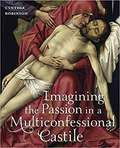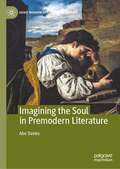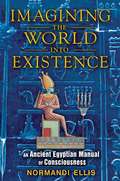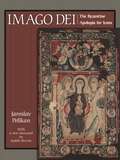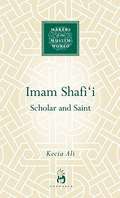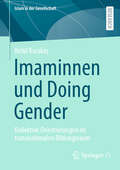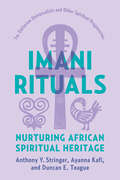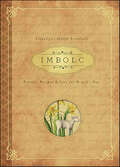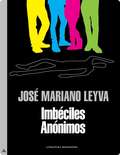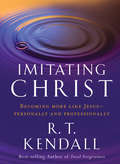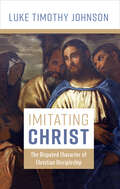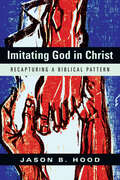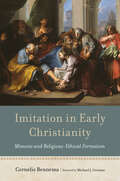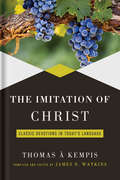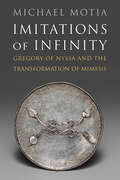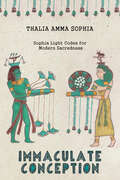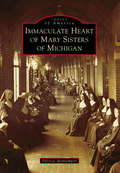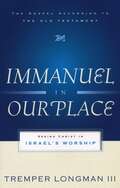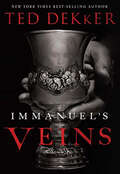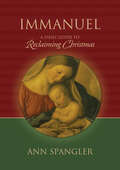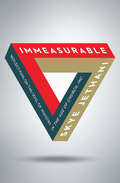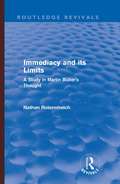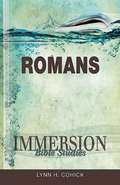- Table View
- List View
Imagining the Passion in a Multiconfessional Castile
by Cynthia RobinsonRecent research into the texts, practices, and visual culture of late medieval devotional life in western Europe has clearly demonstrated the centrality of devotions to Christ’s Passion. The situation in Castile, however, could not have been more different. Prior to the final decades of the fifteenth century, individual relationships to Christ established through the use of “personalized” Passion imagery simply do not appear to have been a component of Castilian devotional culture.
Imagining the Soul in Premodern Literature (Early Modern Literature in History)
by Abe DaviesThis book is a study of ghostly matters - of the soul - in literature spanning the tenth century and the age of Shakespeare. All people, according to John Donne, ‘constantly beleeve’ that they have an immortal soul. But he also reflects that in fact there is nothing ‘so well established as constrains us to beleeve, both that the soul is immortall, and that every particular man hath such a soul’. In understanding the question of man's disembodied part as at once fundamental and fundamentally uncertain he was entirely of his time, and Imagining the Soul in Premodern Literature considers this fraught, shifting, yet uniquely compelling entity in the context of the literary forms and effects involved in its representation. Gruesome medieval dialogues between damned souls and worm-eaten bodies; verse and prose works by Donne, René Descartes, Margaret Cavendish and Andrew Marvell; a profusion of sonnet sequences, sermons, manuals of instruction and travelogues; Hamlet and its natural philosophical thinking about the apparently disembodied soul haunting Elsinore: these chapters range across all this and more, offering a rigorous yet accessible account of an essential aspect of premodern literature that will be of interest to scholars, students and the general reader alike.
Imagining the World into Existence: An Ancient Egyptian Manual of Consciousness
by Normandi EllisReveals the secret language and words of power that enabled the ancient Egyptians to imagine the world into existence • Reveals ancient Egyptian Mystery teachings on immaculate conception, transubstantiation, resurrection, and eternal life • Explores the shamanic journeys that ancient Egyptian priests used to view the unconscious and the afterlife • Provides the essential spiritual tools needed to return to Zep Tepi, the creative source Drawing from the Egyptian Book of the Dead, the Pyramid texts, the Book of Thoth, and other sacred hieroglyphic writings spanning the three millennia of the Egyptian Mystery Traditions, Normandi Ellis reveals the magical language of creation and words of power that enabled the ancient Egyptians to act as co-creators with the gods. Examining the power of hieroglyphic thinking--how thoughts create reality--and the multiple meanings behind every word of power, the author shows how, with the Neteru, we imagine the world into existence, casting a spell of consciousness over the material world. Uncovering the deep layers of meaning and symbol within the myths of the Egyptian gods and goddesses, Ellis investigates the shamanic journeys that ancient Egyptian priests used to view the unconscious and the afterlife and shares their initiations for immaculate conception, transubstantiation, resurrection, and eternal life—initiations that later became part of the Christian mystery school. Revealing the words of power used by these ancient priests/sorcerers, she explains how to search for the deeper, hidden truths beneath their spells and shows how ancient Egyptian consciousness holds the secret of life itself. Revealing the initiatory secrets of the Osirian Mystery school, Ellis provides the essential teachings and shamanic tools needed to return to Zep Tepi--the creative source--as we face the transitional time of radical change currently at hand.
Imago Dei: The Byzantine Apologia for Icons (The A. W. Mellon Lectures in the Fine Arts #36)
by Jaroslav PelikanA sweeping account of the controversies surrounding the worship of images in the early Byzantine churchIn 726, the Byzantine emperor, Leo III, issued an edict that all religious images in the empire were to be destroyed, a directive that was later endorsed by a synod of the church in 753 under his son, Constantine V. If the policy of Iconoclasm had succeeded, the entire history of Christian art—and of the Christian church, at least in the East—would have been altered.Iconoclasm was defeated by Byzantine politics, popular revolts, monastic piety, and, most fundamentally of all, by theology, just as it had been theology that the opponents of images had used to justify their actions. Analyzing an intriguing chapter in the history of ideas, the renowned scholar Jaroslav Pelikan shows how a faith that began by attacking the worship of images ended first in permitting and then in commanding it.Pelikan charts the theological defense of icons during the iconoclastic controversies of the eighth and ninth centuries, whose high point came in 787, when the Second Council of Nicaea restored the cult of images in the church. He demonstrates how the dogmas of the Trinity and the Incarnation eventually provided the basic rationale for images: because the invisible God had become human and therefore personally visible in Jesus Christ, it became permissible to make images of that Image. And because not only the human nature of Christ, but that of his Mother had been transformed by the Incarnation, she, too, could be “iconized,” together with all the other saints and angels.The iconographic “text” of the book is provided by one of the very few surviving icons from the period before Iconoclasm, the Egyptian tapestry Icon of the Virgin now in the Cleveland Museum of Art. Other icons serve to illustrate the theological argument, just as the theological argument serves to explain the icons.In an incisive foreword, Judith Herrin explains the enduring importance of the book and discusses how later scholars have built on Pelikan’s work.Please note: All images in this ebook are presented in black and white and have been reduced in size.
Imam Shafi'i: Scholar and Saint (Makers of the Muslim World)
by Kecia AliIn this innovative study, Kecia Ali examines the forefather of the second largest of the four principal Sunni schools of jurisprudence, the Shafi'i. Gifted poet and outstanding Islamic Scholar, Abu Abdullah Muhammad ibn Idris al-Shafi'i (767-820) firmly rejected the use of common sense in Islamic legal rulings, arguing that the only valid sunnah (or prophetic religious traditions) were directly handed down from Muhammad by Hadith. Kecia Ali is Assistant Professor of Religion at Boston University. She is a world authority on Islamic jurisprudence, and author of Sexual Ethics and Islam: Feminist Reflections on Qur'an, Hadith and Jurisprudence.
Imaminnen und Doing Gender: Kollektive Orientierungen im transnationalen Bildungsraum (Islam in der Gesellschaft)
by Betül KarakoçMoscheen als binär codierte Binnenräume spannen transnationale Bildungsräume auf und stoßen Erziehungs- und Bildungsprozesse an. Durch pädagogische und religiöse Handlungsfelder eröffnen sie Räume der religiösen Wissensvermittlung oder der politischen Bildung, aber auch Räume der Geschlechtererziehung, in denen die Teilhabenden Normen- und Wertevorstellungen verhandeln. Imaminnen in Moscheen lassen sich dabei als pädagogische Orientierungspersonen verstehen, die durch ihre Handlungsfelder Geschlechtervorstellungen verfestigen und an der Konstruktion und Konstitution von Geschlecht mitwirken. Vor diesem Hintergrund rückt die Studie türkische und deutsch-türkische Imaminnen in DITIB-Moscheen in den Vordergrund und rekonstruiert die kollektiven Orientierungen und Modi der Bearbeitung in den Geschlechterkonstruktionen – im Doing Gender – der Imaminnen, die an den theologischen Fakultäten in Ankara und Konya (Türkei) und in unterschiedlichen Moscheegemeinden in Hessen interviewt wurden. Die Studie gibt folglich Aufschlüsse, wie sich Doing Gender im transnationalen Bildungsraum gestaltet und Geschlechterkonstruktionen transnational wirkmächtig werden.
Imani Rituals: Nurturing African Spiritual Heritage
by Dr. Anthony Y. Stringer Ayanna Kafi Rev. Duncan E. TeagueA powerful and necessary collection of rituals centering the African American experience and the African Diaspora.As American society becomes increasingly diverse, people are seeking spiritual inspiration from an expanding array of sources. Unitarian Universalist congregations must be culturally pluralistic to become a religious home to all who cross their threshold. Imani (Swahili for faith) Rituals centers the African American experience and the African Diaspora as the inspiration for rituals to enrich religious and spiritual life for Unitarian Universalists and other liberal denominations.Intended for individual, family, congregational, and community use, the practices in this book offer a creative and contemporary approach to rituals that are grounded in heritage and tradition, creating connection with ancestors and ancient wisdom while responding to the present moment. The rituals include individual practices to promote transcendence, healing, and acceptance; family rituals that honor elders; and community rituals that honor holidays and promote action for social justice, among many others.
Imbolc: Rituals, Recipes & Lore for Brigid's Day (Llewellyn's Sabbat Essentials)
by Carl F. NealImbolc—also known as Brigid's Day—is a time to awaken from our months of introspection and start making plans for the future. This guide to the history and modern celebration of Imbolc shows you how to perform rituals and magic to celebrate and work with the energy of the re-awakening earth.RitualsRecipesLoreSpellsDivinationCraftsCorrespondencesInvocationsPrayersMeditationsLlewellyn's Sabbat Essentials explore the old and new ways of celebrating the seasonal rites that are the cornerstones of the witch's year.
Imbéciles Anónimos
by José Mariano LeyvaImagínate una casa en Cuernavaca, en medio de la nada, que pides prestada a un amigo para exorcizar tus demonios en soledad. Imagina que llegas y, como por arte de magia, va formándose un grupo de imbéciles a los que en tu vida has visto, que aparecen ahí con la misma intención que tú. Imagina entonces un crimen inesperado, del que te vuelves cómplice sin comprender cómo es que de ser un desgraciado te has convertido, de repente, en un asesino. A partir de ese momento, sobra decir que nada volverá a ser igual. "Imbéciles Anónimos es una novela de euforia prolongada por el beat de un DJ. Pero también es una explosión de rabia nihilista como distintivo generacional. En su primera novela, José Mariano Leyva se perfila como un exquisito narrador kamikaze que con la narcosis, el sexo sin profilaxis, la música electrónica y el gadget tecnológico como fuselaje, estalla contra el aquí y el ahora de una sociedad predecible y aburrida. El impulso vital de un grupo de amigos 'hermosos y malditos', (diría Scott Fitzgerald) es el combustible de esta historia."
Imitating Christ: Becoming More Like Jesus
by R.T. KendallBeing a humble Christian does not make you a wimp---it makes you powerful! It's tough to be humble today, whether at home or in your community of relationships. R. T. Kendall wants you to understand that out of that meekness comes majesty and success. In Imitating Christ he carefully explains answers to questions like: •What does it mean to have the mind of Christ? •What motivated Jesus? •How can you become a servant to others? •When was Jesus vindicated, and who vindicated Him?Outlining Christ's capabilities, conscience, and credibility, Kendall invites you to dig deeper in your relationship with the Father.
Imitating Christ: The Disputed Character of Christian Discipleship
by Luke Timothy JohnsonIs discipleship about personal sanctification or social reform? Believers are divided on a question central to Christian identity: what does it mean to follow Jesus? For centuries, imitating Christ meant the pursuit of holiness, conforming the self to Jesus through self-sacrifice in order to join him in eternal life. But some Christians today consider this model to be self-centered. Instead, they say, true disciples ought to imitate Jesus in confronting corrupt social systems on behalf of the oppressed. In Imitating Christ,esteemed New Testament scholar Luke Timothy Johnson seeks the origin of this fissure. Surveying the New Testament, medieval mysticism, modern theology, and more, Johnson shows how twentieth-century social-gospel and liberation theologies created a new model of discipleship. He then evaluates the theological implications of the two models and asks what we can learn from each. Inspired by Dietrich Bonhoeffer and Thomas Merton, Johnson puts forward a vision of discipleship that can revitalize Christian witness in the world today. Replete with keen exegesis and spiritual insight, Imitating Christ reorients Christian living toward pursuing sainthood. Pastors and interested lay readers alike will rediscover a rich heritage in these pages.
Imitation in Early Christianity: Mimesis and Religious-Ethical Formation
by Cornelis BennemaWhat did exhortations to &“follow Jesus&” or &“imitate Christ&” mean to early Christians? Cornelis Bennema examines mimesis as a religious-ethical concept in early Christianity—the imitation of Jesus (and other exemplars) to become a better, more Christlike person. Situating appeals for imitation in the New Testament and Apostolic Fathers within the cultural and social context of the broader Greco-Roman world, Bennema shows how early Christian mimesis was not about literal replication, but instead was a creative, cognitive, and transformative means for shaping conduct and character. As part of this study, Bennema explores key questions about the historic origins of early Christian mimesis; the language that early Christian authors used to articulate the concept of mimesis; the scope, nature, and workings of mimesis in each major section of early Christian literature; and how early Christians navigated the challenges of imitating exemplars (such as Paul or Jesus) who were not physically present. Offering well-researched answers to these questions, Bennema provides readers with a nuanced and informative picture of exhortations to imitation in the New Testament and Apostolic Fathers.
Imitation of Christ: Classic Devotions in Today's Language
by James WatkinsThe timeless classic, The Imitation of Christ, is updated into modern English and arranged topically for daily devotions.
Imitations of Infinity: Gregory of Nyssa and the Transformation of Mimesis (Divinations: Rereading Late Ancient Religion)
by Michael MotiaWe do not have many definitions of Christianity from late antiquity, but among the few extant is the brief statement of Gregory of Nyssa (335-395 CE) that it is "mimesis of the divine nature." The sentence is both a historical gem and theologically puzzling. Gregory was the first Christian to make the infinity of God central to his theological program, but how could he intend for humans to imitate the infinite? If the aim of the Christian life is "never to stop growing towards what is better and never to place any limit on perfection," how could mimesis function within this endless pursuit?In Imitations of Infinity, Michael Motia situates Gregory among Platonist philosophers, rhetorical teachers, and early Christian leaders to demonstrate how much of late ancient life was governed by notions of imitation. Questions both intimate and immense, of education, childcare, or cosmology, all found form in a relationship of archetype and image. It is no wonder that these debates demanded the attention of people at every level of the Roman Empire, including the Christians looking to form new social habits and norms. Whatever else the late ancient transformation of the empire affected, it changed the names, spaces, and characters that filled the imagination and common sense of its citizens, and it changed how they thought of their imitations.Like religion, imitation was a way to organize the world and a way to reach toward new possibilities, Motia argues, and two earlier conceptions of mimesis—one centering on ontological participation, the other on aesthetic representation—merged in late antiquity. As philosophers and religious leaders pondered how linking oneself to reality depended on practices of representation, their theoretical debates accompanied practical concerns about what kinds of objects would best guide practitioners toward the divine. Motia places Gregory within a broader landscape of figures who retheorized the role of mimesis in search of perfection. No longer was imitation a marker of inauthenticity or immaturity. Mimesis became a way of life.
Immaculate Conception: Sophia Light Codes for Modern Sacredness
by Thalia Amma SophiaMiracles and phenomena of mystery between black magic, miracles and phenomena and religion. The first and last parts of Immaculate Conception tell the story of how a girl of the light becomes a real woman and let her wings unfurl. Through trials and tribulations, the reader is invited to reflect on testimonials of an initiate in a patriarchal society of dogma.At its core, this is a tale of a young woman in search of a life filled with love, spirituality, and the simple joys of existence, all while embracing her soul&’s destiny. Her story unfolds amidst the backdrop of stress, drama, &‘a-ha!&’ moments, and deep-rooted family traditions, guided by the steadfast presence of God&’s apostles.The second part is packed with rituals, channelled prayers, affirmations, and angelic protection invocations, to call on for a while or at various times. Special Key phrases have Sophia Codes that are lately coming to humanity for co-creating, healing, and expanding. With the support of Mother Mary and Archangels, Thalia Amma Sophia opens you to receive grace, brings you alignment and activation of your Higher Self; to neutralize the magnets pulling you into dysfunctional behaviour and past Life overlays!Prepare to awaken your innate ability to manifest desires and nurture creative ideas. Immaculate Conception extends an invitation to embark on a transformative journey where miracles, faith, and the boundless power of the human spirit intersect, promising the potential for grace, fulfilment, and profound transformation.
Immaculate Heart of Mary Sisters of Michigan (Images of America)
by Patricia MontemurriSince 1845, along the River Raisin in the southeastern Michigan town of Monroe, the Sisters, Servants of the Immaculate Heart of Mary (IHM) have distinguished themselves as educators, activists, and Catholic pioneers. At the congregation's peak, the motherhouse dispatched nearly 1,600 nuns to more than 100 schools across metropolitan Detroit and several states. For 175 years, the sisters taught the three Rs and the meaning of faith to nearly 700,000 students and established important metro Detroit institutions such as Marygrove College, Immaculata and Marian High Schools, and St. Mary Academy. Widely known by their initials, the IHMs have extended their reach worldwide. Monroe IHM members have served in key roles at the Vatican, as leaders of organizations representing Catholic sisters in the United States, as missionaries in Third World countries, and as groundbreaking activists and theologians. The Monroe IHMs today also attract lay women and men who dedicate themselves to the congregation's values and goals by becoming IHM Associates.
Immagini Scritte
by Antonio Carlos Mongiardim Gomes Saraiva Annalisa Farina"Immagini scritte" raccoglie 100 poesie scelte dall'autore e associa immagini a tema per sottolineare il contenuto e l'espressività dei testi poetici.
Immanuel In Our Place: Seeing Christ In Israel's Worship (The Gospel According To The Old Testament Series)
by Tremper LongmanThis book provides fascinating insights into the Old Testament tabernacle and temple, the priesthood, the sacrifices, and festivals. More than that, it shows how Jesus is the fulfillment of Old Testament sacred space, sacred acts, sacred persons, and sacred time. An aid to pastors, teachers, and laymen in teaching and reading the Old Testament, this work will enrich our understanding of Christ and deepen our worship.
Immanuel's Veins
by Ted DekkerThis story is for everyone--but not everyone is for this story. It is a dangerous tale of times past. A love story full of deep seduction. A story of terrible longing and bold sacrifice. Then as now, evil begins its courtship cloaked in light. And the heart embraces what it should flee. Forgetting it once had a truer lover. With a kiss, evil will ravage body, soul, and mind. Yet there remains hope, because the heart knows no bounds. Love will prove greater than lust. Sacrifice will overcome seduction. And blood will flow. Because the battle for the heart is always violently opposed. For those desperate to drink deep from this fountain of life, enter. But remember, not everyone is for this story. "A heart-wrenching journey of redemption and hope that left me sobbing, laughing, and clinging to every word."--Donna McChristian, 44, Environmental Chemist
Immanuel: A Daily Guide to Reclaiming Christmas
by Ann SpanglerAnn Spangler believes it’s possible to transform the crazy, wonderful, stressful season we call Christmas into one of greater peace and deeper joy by recovering the gift of Advent.For hundreds of years, Christians have prepared for Christmas by carefully observing the four-week season leading up to it. What’s more, when Christmas did arrive, they celebrated not just for one day but for twelve! So four weeks for Advent and nearly two weeks for Christmas makes six weeks, which is why Ann Spangler has prepared this six-week Christmas devotional.Drawing from her bestselling books Praying the Names of God and Praying the Names of Jesus, Spangler selected six names or titles—including Immanuel, Yeshua, and Bright Morning Star. Each name offers a week’s worth of devotions focusing on God, the miraculous birth of his son, and the promise of his return. In Immanuel, you’ll discover a perfect balance of prayer, reflection, and study to help you open your heart fully to the birth of Jesus and all that it means.
Immeasurable: Reflections on the Soul of Ministry in the Age of Church, Inc.
by Skye JethaniCHRISTIANITY TODAY'S PASTORAL/CHURCH LEADERSHIP BOOK OF THE YEAR 2017 &“In my first seminary class, we were asked to introduce ourselves and say why we enrolled. I&’ll never forget what one student said…&‘My denomination wants me to have an M.Div., but once they see I can grow a big church, I don't think they'll make me finish the program.&’&”The priorities of this future pastor were startling, but he&’s not alone in them.In the years since that class, author and minister Skye Jethani has seen more and more pastors swallowed by the celebrity syndrome. Not long ago, ministers were among the most trusted and admired people in our culture. But not anymore. A 2013 study from Gallop revealed that Americans&’ admiration for clergy has reached an all-time low. That, taken with reduced trust of institutional religion overall, makes it easy to see why ministers feel insecure about their calling. In response to this trend, some pastors have looked to emulate those who are praised by the culture—business leaders, entertainers, and social activists. This has led to a new understanding of what a minister should be. We&’ve turned away from viewing our pastors as shepherds, and now expect them to be celebrities. Immeasurable will help ministers recognize the cultural forces shaping their view of the calling, and then reimagine what faithful church leaders can look like in the twenty-first century. Through short essays and reflections on the pastor&’s soul and skills, this book will help prospective pastors explore their calling to ministry, and it will help veteran pastors reframe their vision for the work. Drawing on cultural dynamics, personal stories, and his own experience working in a church and with church leaders, Skye Jethani will address matters like ambition, anger, community, consumerism, fame, health, justice, platform, preaching, rest,simplicity, success, vision, and more. There are endless resources to help pastors do the practical work of ministry, but there are far fewer that speak to the pastor&’s soul and spirit. Immeasurable provides affirmation and encouragement for church leaders faithfully serving God. It commends the true work of ministry—shepherding, teaching, encouraging—while redefining what we mean by success in ministry. It&’s a book church leaders can return to again and again for insight and inspiration.
Immeasurable: Reflections on the Soul of Ministry in the Age of Church, Inc.
by Skye JethaniCHRISTIANITY TODAY'S PASTORAL/CHURCH LEADERSHIP BOOK OF THE YEAR 2017 &“In my first seminary class, we were asked to introduce ourselves and say why we enrolled. I&’ll never forget what one student said…&‘My denomination wants me to have an M.Div., but once they see I can grow a big church, I don't think they'll make me finish the program.&’&”The priorities of this future pastor were startling, but he&’s not alone in them.In the years since that class, author and minister Skye Jethani has seen more and more pastors swallowed by the celebrity syndrome. Not long ago, ministers were among the most trusted and admired people in our culture. But not anymore. A 2013 study from Gallop revealed that Americans&’ admiration for clergy has reached an all-time low. That, taken with reduced trust of institutional religion overall, makes it easy to see why ministers feel insecure about their calling. In response to this trend, some pastors have looked to emulate those who are praised by the culture—business leaders, entertainers, and social activists. This has led to a new understanding of what a minister should be. We&’ve turned away from viewing our pastors as shepherds, and now expect them to be celebrities. Immeasurable will help ministers recognize the cultural forces shaping their view of the calling, and then reimagine what faithful church leaders can look like in the twenty-first century. Through short essays and reflections on the pastor&’s soul and skills, this book will help prospective pastors explore their calling to ministry, and it will help veteran pastors reframe their vision for the work. Drawing on cultural dynamics, personal stories, and his own experience working in a church and with church leaders, Skye Jethani will address matters like ambition, anger, community, consumerism, fame, health, justice, platform, preaching, rest,simplicity, success, vision, and more. There are endless resources to help pastors do the practical work of ministry, but there are far fewer that speak to the pastor&’s soul and spirit. Immeasurable provides affirmation and encouragement for church leaders faithfully serving God. It commends the true work of ministry—shepherding, teaching, encouraging—while redefining what we mean by success in ministry. It&’s a book church leaders can return to again and again for insight and inspiration.
Immediacy and its Limits: A Study in Martin Buber's Thought (Routledge Revivals)
by Nathan RotenstreichOriginally published in 1991, this book focuses on a major problem in the philosophy of Martin Buber. This is the topic of immediacy which is presented in terms of the contact between human beings on the one hand, and man and God on the other. The basic theme throughout is whether the I-Thou relation refers to immediate contact between human beings, as Buber saw it, or whether that relation is something established or aspired to. This is an important study which should be consulted in any future discussion of Martin Buber’s thought. At the same time, it raises critical issues for recent European philosophy. Students of philosophy, and religious and social thought will find its critical exposition extremely helpful.
Immersion Bible Studies | Romans: Romans
by Lynn H. CohickJourney inside the pages of Scripture to meet a personal God who enters individual lives and begins a creative work from the inside out. Shaped with the individual in mind, Immersion encourages simultaneous engagement both with the Word of God and with the God of the Word to become a new creation in Christ. Immersion, inspired by a fresh translation--the Common English Bible--stands firmly on Scripture and helps readers explore the emotional, spiritual, and intellectual needs of their personal faith. More importantly, they'll be able to discover God's revelation through readings and reflections.
